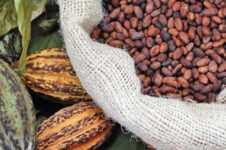
Riisa program to boost Davao’s cacao production
THE Resilience Investment Inclusion for Sustainable Agrikultura (Riisa) program aims to boost cacao production in Davao City by supporting local farmers.
Fe Oguio, the Fruit Production focal person from the City Agriculturist Office (Cagro), said in a radio interview on Davao City Disaster Radio (DCDR) on September 11, 2024, that the global demand for cacao is rising, yet the Davao Region—recognized as the Philippines’ cacao capital—struggles to meet this demand.
She explained that, in collaboration with Mennonite Economic Development Associates (Meda), the Riisa program will assist local farmers by improving productivity, soil health, and environmental protection.
“Throughout the Philippines ang problem gyud natu kay low productivity pero kita sa region ni angkon naman ta sa 80 porsyento sa production sa Pilipinas still, ang atoang productivity muingon ta nga dili pa gyud kaayo siya taas maong rason na ang uban na mga farmers murag nawad-an, naluya sa ilang pag-uma (Low productivity is a nationwide issue for cacao farming. While our region contributes nearly 80 percent of the country’s cacao production, our output remains low. This has caused some farmers to lose hope and become discouraged with their farming efforts),” she said.
Oguio said that although the region leads in cacao production, it still falls short of meeting demand. The primary challenge lies in the care of the cacao plants, which has been affected by rising farm input costs, making it difficult for farmers to maintain plant health. Additionally, many farmers are elderly, further contributing to the issue.
Jerick Axalan, MEDA’s market system development technical lead, echoed this concern, stating that local cacao farmers are unable to meet the current demand. Through the RIISA program, they aim to improve farming practices to boost cacao production.
“Ang tumong gyud sa project sa RIISA kay mahimong resilient atoang mga mag-uuma pinaagi sa paghatag ug mga kapasidad na training, pamaagi sa pag link sa mga financial na mga institutions arun naa pod silay finances (The main goal of the Riisa project is to build resilience among our farmers by offering capacity training and connecting them with financial institutions, so they have access to the necessary funds),” he said.
In addition to providing capacity training and financial linkages, Axalan highlighted programs like Cacao Caravan and Project Living Income, as well as partnerships with cooperatives, to enhance incentives for small local cacao farmers.
He explained that Davao City was chosen for assistance due to its potential for producing high-quality cacao. They also aim to address the challenges of cacao farming, including involving women and tackling environmental issues.
Axalan noted that a major problem in Davao City’s cacao industry is low productivity, which fails to meet local demand and contributes to high cacao prices.
According to the Philippine Statistics Authority, the Davao Region continues to lead cacao production in the Philippines, producing 1,670 metric tons, or 71.2 percent of the country’s total cacao output from April to June 2023.
Nationwide, the area planted with cacao grew to approximately 32.24 thousand hectares from January to June 2023, marking a 1.5 percent increase from the 31.75 thousand hectares in 2022.
Meda, a Canadian non-profit organization with branches in over 70 countries, focuses on creating business solutions to combat poverty. RGP



